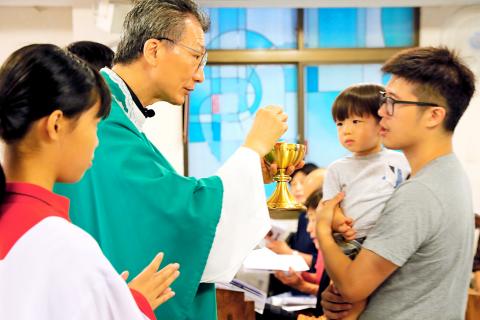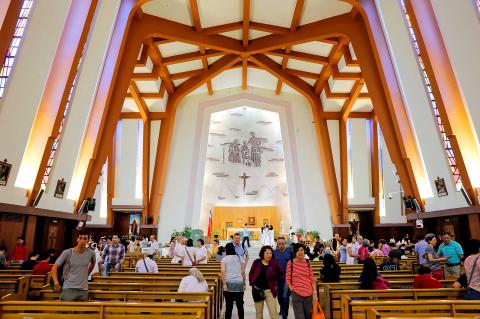Worshipers at Masses in Hong Kong and Taiwan yesterday were largely upbeat about a new deal between China and the Vatican, despite fears Beijing is trying to increase control over the Catholic Church.
Cardinal Joseph Zen (陳日君), the outspoken former bishop of Hong Kong, accused Vatican officials of “selling out” ahead of Saturday’s agreement and in a blog post shortly after the announcement he raised concern over its impact.
“What will the government say to Catholics in China? ‘Obey us, the Holy See is already in agreement with us?’” the cardinal wrote.

Photo: Daniel Shih, AFP
Comments on social media accused the Vatican of turning a blind eye to a “silent cultural revolution” in China, where churches have been destroyed in recent months and there has been a clampdown on Bible sales.
However, churchgoers in Hong Kong gave the deal a cautious welcome.
A parishioner who gave her name as Teresa at the Cathedral of the Immaculate Conception in Hong Kong said: “More contact is positive,” adding that she was not worried warming ties between Beijing and the Vatican would lead to interference in the territory’s Catholic churches.

Photo: Daniel Shih, AFP
Another who gave her name as Nikki said: “Any cooperation between the two sides has to be a good thing, as long as it’s equal cooperation.”
In Taiwan, some worshipers worried the new deal meant the nation would lose its only official ally in Europe.
Online comments on the Liberty Times (the Taipei Times’ sister newspaper) Facebook page accused the Vatican of “dealing with the devil,” but churchgoers remained confident.
“I think the pope’s consideration in signing the agreement is to promote religious freedom rather than establishing diplomatic relations with China, so there is no need to politicize him,” said parishioner Yuan Shi-min at Our Lady of Fatima in Taipei.
China’s 12 million Catholics are divided between a state-run association whose clergy are chosen by the government and an unofficial church that swears allegiance to the pope.
The agreement struck on Saturday was aimed at resolving a decades-old dispute over who gets to name Catholic bishops in China, and could lead to a rapprochement for the first time since diplomatic ties were severed in 1951.
Shortly after the deal was announced, Pope Francis recognized seven clergy appointed by Beijing.
China’s state-supervised Catholic Patriotic Association yesterday reaffirmed its loyalty to the Chinese Communist Party, while welcoming the deal.
The Catholic Church in China said it would “persevere to walk a path suited to a socialist society, under the leadership of the Chinese Communist Party.”
It “deeply loved the motherland” and “sincerely endorsed” the agreement, hoping relations between China and the Vatican would improve further, it added in comments on its Web site.
Additional reporting by Reuters

MORE VISITORS: The Tourism Administration said that it is seeing positive prospects in its efforts to expand the tourism market in North America and Europe Taiwan has been ranked as the cheapest place in the world to travel to this year, based on a list recommended by NerdWallet. The San Francisco-based personal finance company said that Taiwan topped the list of 16 nations it chose for budget travelers because US tourists do not need visas and travelers can easily have a good meal for less than US$10. A bus ride in Taipei costs just under US$0.50, while subway rides start at US$0.60, the firm said, adding that public transportation in Taiwan is easy to navigate. The firm also called Taiwan a “food lover’s paradise,” citing inexpensive breakfast stalls

TRADE: A mandatory declaration of origin for manufactured goods bound for the US is to take effect on May 7 to block China from exploiting Taiwan’s trade channels All products manufactured in Taiwan and exported to the US must include a signed declaration of origin starting on May 7, the Bureau of Foreign Trade announced yesterday. US President Donald Trump on April 2 imposed a 32 percent tariff on imports from Taiwan, but one week later announced a 90-day pause on its implementation. However, a universal 10 percent tariff was immediately applied to most imports from around the world. On April 12, the Trump administration further exempted computers, smartphones and semiconductors from the new tariffs. In response, President William Lai’s (賴清德) administration has introduced a series of countermeasures to support affected

CROSS-STRAIT: The vast majority of Taiwanese support maintaining the ‘status quo,’ while concern is rising about Beijing’s influence operations More than eight out of 10 Taiwanese reject Beijing’s “one country, two systems” framework for cross-strait relations, according to a survey released by the Mainland Affairs Council (MAC) on Thursday. The MAC’s latest quarterly survey found that 84.4 percent of respondents opposed Beijing’s “one country, two systems” formula for handling cross-strait relations — a figure consistent with past polling. Over the past three years, opposition to the framework has remained high, ranging from a low of 83.6 percent in April 2023 to a peak of 89.6 percent in April last year. In the most recent poll, 82.5 percent also rejected China’s

PLUGGING HOLES: The amendments would bring the legislation in line with systems found in other countries such as Japan and the US, Legislator Chen Kuan-ting said Democratic Progressive Party (DPP) Legislator Chen Kuan-ting (陳冠廷) has proposed amending national security legislation amid a spate of espionage cases. Potential gaps in security vetting procedures for personnel with access to sensitive information prompted him to propose the amendments, which would introduce changes to Article 14 of the Classified National Security Information Protection Act (國家機密保護法), Chen said yesterday. The proposal, which aims to enhance interagency vetting procedures and reduce the risk of classified information leaks, would establish a comprehensive security clearance system in Taiwan, he said. The amendment would require character and loyalty checks for civil servants and intelligence personnel prior to